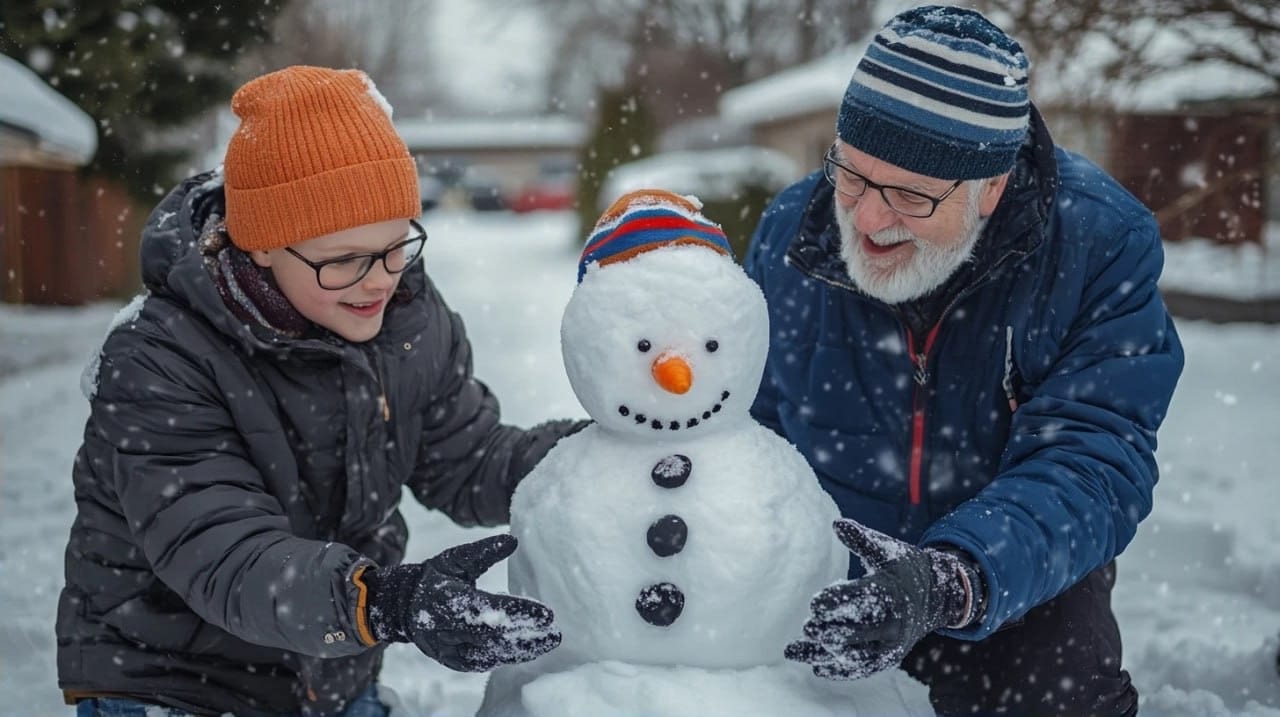Why It's Important to Gather with a Family at Least Once a Year
The fast pace of modern life leaves less time for loved ones, making family gatherings a rarity. Some family members live in different cities or countries, others have busy work schedules, and some simply aren't used to such traditions.

But one gathering a year isn't much, and its impact can be huge. It's an opportunity to strengthen family bonds, create memories, pass down traditions to the younger generation, and simply feel like part of something big and important.
In this article, we'll explore why it's valuable to gather the whole family at least once a year and how to organize such a meeting, even when it seems challenging.
Family is Our Support and Source of Strength
Everyone needs support and understanding. Even if some of your relatives tend to keep to themselves, still invite them to the family gathering. If convincing them on your own is hard, offer any argument from our list:
- Family is the only safe environment. Ideally, relatives accept all our quirks, gently point out flaws, and generally let us relax. Within the family circle, you can openly discuss concerns, share joys and failures. This helps you feel that you're not alone and that your problems matter to others.
- The quality of family communication affects psychological health. Communicating with loved ones helps reduce stress hormone levels. Even a short but kind chat with relatives can boost serotonin levels, responsible for a good mood.
- Family gatherings provide an opportunity to strengthen relationships. Even if there were disagreements in the past, face-to-face interactions and shared memories help make connections better than occasional messages.
- Meetings with relatives are crucial for kids from single-parent families. Children growing up in single-parent homes may feel lonely and deprived. By interacting with distant or step-relatives, they learn what they didn't receive from their closest family and feel a sense of belonging to their community.
- Bringing the family together means helping members develop important social skills.
SEL or Social–Emotional Learning skills are crucial for both children and adults, and "learning" can continue throughout life. Meeting during the weekdays and holidays, relatives communicate, solve common tasks — in general, they learn to understand themselves and others.
The most important SEL skills include:
- self-awareness — understanding yourself as part of the world. Strengths and weaknesses, character, values, and feelings;
- social awareness — understanding the feelings of others;
- relationship skills — the ability to build healthy relationships with others;
- self-regulation — the ability to follow plans and achieve goals. The strength that helps control your life;
- responsible decision-making — the skill to make logically correct choices, considering all inputs.
How to Host a Family Gathering
Organizing a family gathering may seem like a daunting task, but each step is manageable.
- Suggest a meeting to your relatives. Reach out to family members in a convenient way and propose several dates to choose from.
Tip
Don't hesitate to emphasize how much this gathering means to you. Sometimes, organizing a family meeting requires being honest, like admitting, "I really need us to be together on this day."
- Establish a tradition. Dedicate one day a year when everyone can gather, like Christmas, Family Day, or a birthday. Let it become a mandatory annual event for every family member. Once this tradition is established, start suggesting more personal customs that will bring you closer to your relatives.
Tip
If a major holiday isn't around the corner, set up an informal gathering rather than postponing it to a symbolic date. It could be a simple potluck party, but the main thing is that you provide an opportunity for the family to socialize.
- Create a group chat in a messenger. Start with organizing a large family meeting and continue exchanging news in this chat. Whether it’s funny animal videos or children's academic successes — you can discuss anything and support each other in your "family chat".
- Maintain a comfortable atmosphere. Be prepared to steer clear of controversial topics. Focus on the joy of being together. Discussing politics or tastes can be engaging and interesting, but it can be hard to stop, and everyone may suffer as a result.
Quick guide to essential communication principles at a family gathering
Focus on the positives rather than dwelling on past grievances.
Avoid contentious subjects if they could lead to arguments.
Avoid imposing your opinion; respect others' views instead.
Acknowledge step or adoptive family members as equals.
Don't hesitate to express genuine emotions and share news, even if you initially wished to keep something private.
Refrain from imposing a fixed plan for the gathering if someone is reluctant to follow it.
- Assign roles to each family member. People will naturally want to participate in preparing the event and will feel more invested if each takes a responsibility: someone can handle snacks, another can document the gathering for future memories, and another can plan the entertainment.
Tip
Don't take on all the responsibility for organizing and preparing the event. Otherwise, your relatives will just be guests rather than participants in the gathering. When everyone contributes, they gain a sense of belonging and full engagement.
Activities for a Family Gathering
Include activities that everyone will enjoy in the gathering’s program, and try to spend time with each family member equally.
- Gift exchange. Make it a tradition to swap at least symbolic gifts with family members. Over time, you'll get to know each other better if you haven't met frequently, making gift-giving easier and more delightful.
- Bonding activities. Stock up on board games everyone enjoys. Set aside time to look through family photo albums or prepare dishes reminiscent of shared childhood memories. Another excellent option for shared enjoyment is fun Christmas games, if that's the joyous occasion you're celebrating together.
Fun bonding Christmas activity
Buy a large poster board or A3 sheet. Boldly write the upcoming year's digits, like 2026, and one by one, share goals associated with them. For example, "I will make 2 new friends, hurt 0 people, feed at least 2 homeless dogs, and achieve 6 career breakthroughs." Let everyone share their plans this unique way. This way, the whole family will get to know each other better.
- Activities for children. If you're particularly tired and not ready to spend the evening solely on children's games, subtly encourage them to connect. The future of your family depends on their interactions, and whether your family traditions and gatherings continue.
Tip
Teenagers might pose a bigger challenge — many prefer the company of their partner or friends over family dinners. It's better to start fostering their connection through interactions with engaging older family members and gradually involve their children too.
How Secret Santa Helps Family Bonding
The Secret Santa game is a perfect tool for family bonding. The premise is a gift exchange by lottery. Participants randomly draw the name of the person they must surprise, keeping their identity secret until the moment of gift-giving.
The classic version of the game has several benefits:
- drawing names by hand is a great excuse for an impromptu family get-together
- choosing a gift requires considering what your relative likes, offering a wonderful chance to get to know each other better
- Secret Santa can become an annual tradition, and traditions are the foundation of family closeness.
But despite all the advantages, it has one significant drawback: it's challenging to organize. If you have a large family living in different cities, and it's hard to explain to kids not to lose the slip with their assigned person’s name, and you have limited free time, the MySanta service can help. This online platform handles all the organizational work, leaving you to simply enjoy the game tailored to your preferences.
What makes the the MySanta service an ideal option for running for a family game?
- Simple organization. Just create a game, add participants, and set the rules. The service randomly assigns pairs, sends notifications, and helps maintain participant anonymity.
- Remote participation. No matter where your relatives are — the service operates online. You can set the gift exchange format when creating the game: in person, by mail, or via courier.
- Family-specific exceptions. You can specify conditions: for instance, ensuring spouses don’t draw each other or kids play only among themselves.
- Gift selection help. The platform allows participants to create a wish list, so when each Santa has clear guidance, nobody ends up with an unwanted gift.
- Time and stress saving. There's no need to gather everyone in person, draw names, or make lists. The game becomes easy and accessible for everyone, even senior relatives and small children.

Many of us don’t realize the value of regular family gatherings, viewing relatives as a constant given.
Even one day a year is hardly too much, even for those who aren't fond of company. Yet, this leaves an imprint on our lives. It's the joy of communication, warm memories, and strong ties between generations.
Don't put off the meeting for later. Call or write to your relatives, suggest meeting, and choose a date together. Perhaps this gathering will mark the beginning of a new family tradition.
FAQs
What are some alternative ways to connect with family if in-person gatherings are not possible?
Virtual gatherings using video conferencing platforms are a great substitute, allowing for shared meals, games, and conversations. Regular phone calls, sharing photos and videos online, and sending handwritten letters can also strengthen bonds at a distance.
What are some affordable gathering ideas for families on a budget?
Host a potluck-style meal where everyone contributes a dish, eliminating the financial burden on one person. Organize a game night with board games or card games you already own, or plan a free outdoor activity like a hike or picnic in a local park.
What activities can make family gatherings more engaging and memorable?
Consider activities like sharing family stories and photos, playing collaborative games, or creating a family tree together. Volunteering for a local cause as a group can also foster connection and create lasting memories, while a talent show can encourage laughter and self-expression.


